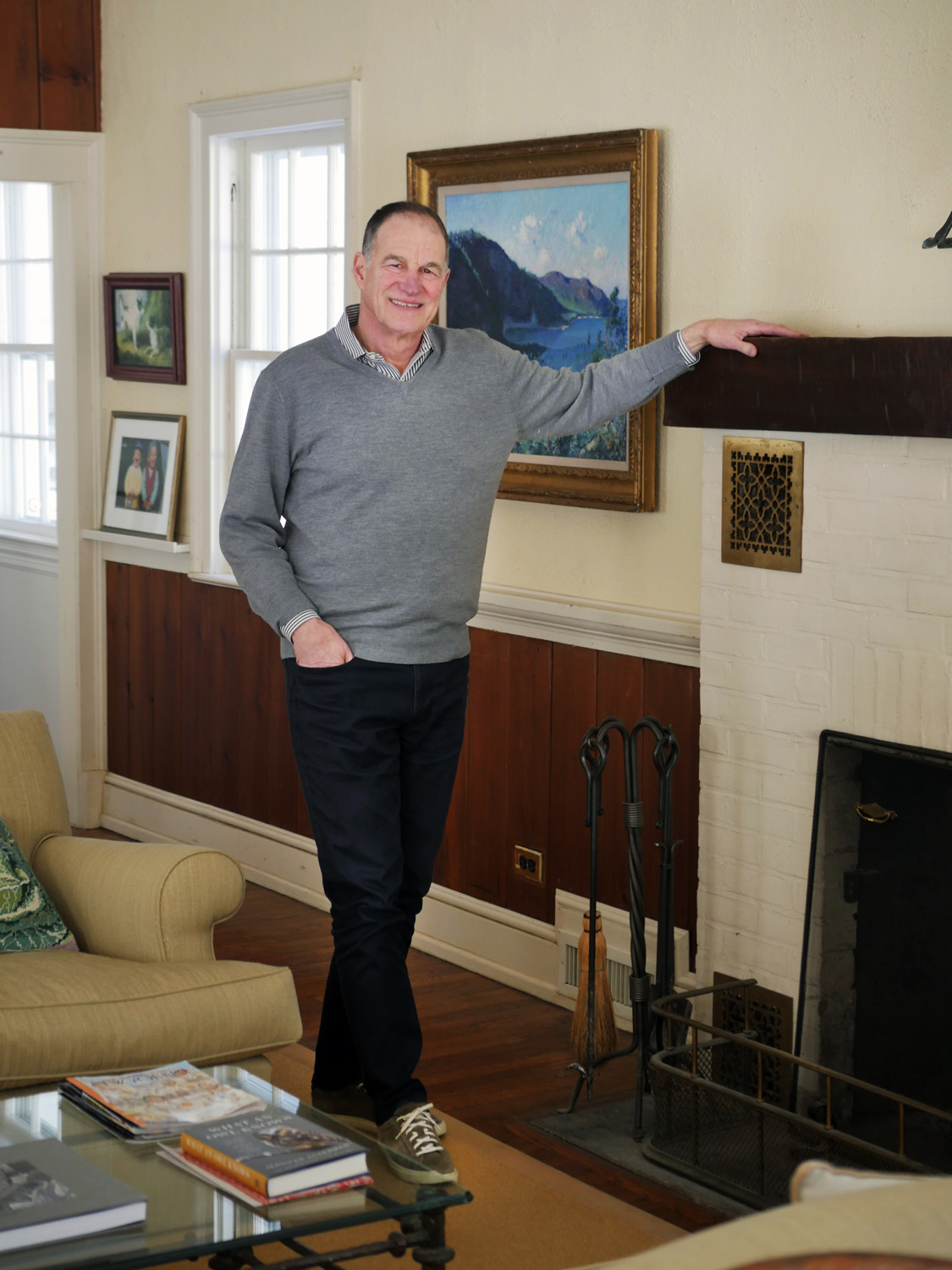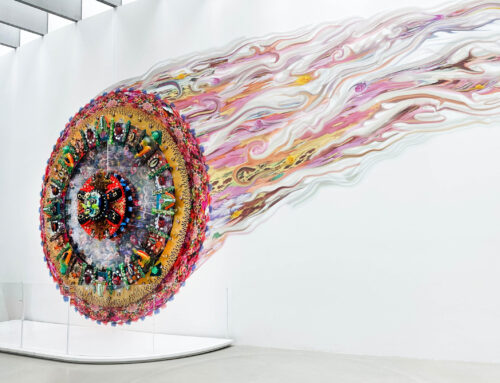Over his 30+ year career at The New York Times, Trip Gabriel’s visionary leadership has touched millions, and his in-depth reporting has impacted the lives of several notable figures. Now, he’s introducing us to incredible people we never knew.
By Gia Miller
Photography by Justin Negard
When Pound Ridge resident New York Times’ style section in 1997, it was nothing like what it is today.
“From the beginning, it was wildly ridiculed,” Gabriel remembers. “It was ‘The Gray Lady’s’ alter ego. I think Newsweek wrote, ‘The New York Times’ style section is like the grandmother who is squeezing into a pair of bicycle shorts long after everybody else has moved on.’ It was just ridiculed. It was canceled. It was killed. And then the decision was made to relaunch it, probably based on the potential ad revenue from the luxury fashion business. I had been a reporter in the style department, and they tapped me to edit that section.”
Gabriel began working at The Times in 1992, leaving a successful freelance writing career for a steady paycheck and benefits. He’d written for magazines such as Rolling Stone, Outside and Sports Illustrated, covering lifestyle and culture, so he knew the genre. But what he didn’t know was that his vision would transform the paper’s national embarrassment into a widely popular, beloved column that has captivated millions of readers nationwide, sparking books, a podcast and even a TV show.
The founding editor of the Sunday Styles section and later the Thursday Styles section, Gabriel also conceived of and launched the Modern Love column in 2004. And while he knew his idea had potential, he was surprised by how quickly it took off.
“You don’t often get an opportunity to do something that’s an instant success, but this one surely was,” he says. “We began the column by soliciting essays from well-known writers, but soon after we launched, we published a little email address at the bottom of one of the columns. We didn’t introduce it, didn’t say anything about it, but people thought, ‘Oh, maybe I should write one of these essays.’ And it just opened the floodgates. Literally thousands of essays came to us unsolicited, and that’s been the case for the last 20 years.”
Almost immediately, Gabriel assigned the column to its current editor, Daniel Jones, who he says “still does all the heavy lifting,” citing this as the reason for Modern Love’s ongoing success.
And although Gabriel chose to leave the Styles section six years after launching Modern Love, his work at The New York Times has continued to impact people’s lives. From reporting on “one of the most backwards parts of our country” to writing a controversial profile that ended the career of an infamous politician, Gabriel, who is now contentedly at The Times’ obituaries desk, has covered all the topics we’re told don’t belong in polite conversation. And he’s lived to tell the tales.
Telling America’s stories
When Gabriel decided to make a change in 2010, he says it was because he no longer wanted to manage people; plus, he missed reporting. Gabriel wanted to try his hand at hard news, so he resumed life as a journalist, covering education for two years, often focusing on technology’s impact on students and teachers, and then moving to politics, focusing on voters.
During his 12 years covering politics, Gabriel’s articles helped readers understand America’s voters and politicians. For example, in 2015, Gabriel relocated to Iowa to cover the state’s renowned presidential caucuses, and it was during this period his article exposing Ben Carson’s ignorance of foreign policy gained significant attention. Gabriel also notably detailed Pete Buttigieg’s political rise in 2020, and his reporting on the issue of the Republican Party’s use of critical race theory as a cultural wedge gained traction nationwide. But one of his most memorable experiences was a story Gabriel penned during the fifty-year anniversary of President Lyndon B. Johnson’s “unconditional war on poverty.”
In 2014, Gabriel was working as the Mid-Atlantic bureau chief. It was the beginning of the second wave of the opioid crisis, and Gabriel was assigned a story on poverty, so he headed to West Virginia, a state he says he “got to know really well.”
“I spent a lot of time in the Appalachian Mountains interviewing people who were so cut off from this world,” he remembers.
“It’s one of the most troubled parts of our country, and I wrote a very long story about that area and the people who live there. After my article was published, Senator Joe Manchin’s office kind of adopted a girl I wrote about. She grew up in a very impoverished situation and was 15 years old. She said, ‘I just don’t want to get pregnant. I want to go to college and be a veterinarian.’ No one in her family had graduated high school. Manchin’s office read the article and took her on as a project. They helped her go to college, and they gave her a lot of support.”
After covering two presidential elections, and when it became clear Presidents Biden and Trump would rematch in 2024, Gabriel decided it was time to hang up his political hat. He’d covered this race once before, and he was ready to move on. One of the last political stories he wrote is another one of the pieces he cherishes.
“It was about a family that was leaving Iowa,” he explains. “They had a transgender teenage son, and Iowa had passed a law that outlawed gender-affirming health care for trans teenagers. They were moving to Minnesota so their son could continue to receive his medication. And I contrasted their story with another family that had left the very liberal state of Oregon because they hated the politics there. They felt like the liberals in Portland had gone crazy because they passed a law that decriminalized drug use and didn’t crack down on the homeless. They believed the quality of life had so deteriorated that they wanted to move to a very deep, red, conservative part of the country. So, they moved to Missouri.”
“These two contrasting families left the states they loved and were native to because the politics had become so poisonous to them,” he continues. “To me, that was very emblematic of how our country is pulling apart into two tribes.”
Reporting the truth
Perhaps Gabriel’s most impactful story while covering politics was his June 2019 article about Representative Steve King of Iowa.
“He was a blatant white supremacist,” Gabriel explains. “Comment after comment was racist, but he was continually re-elected. He was a congressman from the most conservative part of Iowa; he was Trump before Trump in a lot of ways. He wanted to build a wall on the southern border. He said very demeaning things about the people we call Dreamers—he wanted them all deported. He would propose every kind of immigration reform bill that ever came through Congress.”

Tablet featuring Gabriel’s news article about Representative Steve King of Iowa.
Gabriel was writing a profile piece on King (titled “Before Trump, Steve King Set the Agenda for the Wall and Anti-Immigrant Politics”), and even though King notoriously didn’t like speaking with the press, Gabriel decided to give him a call.
“One of the things you learn as a journalist is that everybody wants people to understand them,” he explains. “If you approach somebody courteously and without prejudice, they want to talk. They want to be understood. And Steve was a perfect example. We spoke on the phone for an hour one morning.”
During that call, King told Gabriel, “White nationalist, white supremacist, Western civilization—how did that language become offensive?” Gabriel included that quote in his story, but when his editor wanted to move it from paragraph 14 to the top, Gabriel disagreed. Given King’s history, Gabriel viewed it as just another provocative comment. But his editor was right. And after the story ran, Gabriel received a call from Washington.
“Kevin McCarthy, who was the Republican Speaker, called me up and asked, ‘Did he [King] really say that?’” Gabriel remembers. “I confirmed he did, and then Kevin McCarthy actually moved to push him out of the Republican conference.”
McCarthy immediately removed King from his committee assignments, and King lost his re-election bid in a 2020 primary. Gabriel says some people in Iowa still won’t speak to him because they blame him for ending King’s career, and King has never forgiven him. But, according to Gabriel, that article wasn’t solely to blame. King was increasingly viewed as toxic by his own party; he barely won his 2018 re-election race in a “very, very safe Republican district.” King’s party wanted to get rid of him; they were afraid he’d lose the seat to a Democrat. And that quote was the tipping point.
“It was just very blatant,” says Gabriel. “He claims he was misquoted, but he really did say it. And I understand what he was talking about. In his mind, if you’re on the hard right, criticizing people’s ethnicity doesn’t make you racist. But it was the way he said it. Plus, he was an admirer of all those neo-Nazis in Europe as well as other horrible people. He had even flown to Europe to meet with them.”
“The whole thing moved very quickly,” Gabriel continues. “And while I wasn’t surprised he said it, I was surprised McCarthy called me up. It’s very rare that something a member of Congress says in the media scuttles their career.”
Gaining a new perspective
Gabriel’s time covering politics and voters gave him a unique perspective on how people choose their candidate. It’s quite different from what he initially believed.
“Most voters don’t pay very close attention to what’s going on in politics,” he explains. “They have actual lives, unlike political junkies who are either reporting on it or regularly following it. I think I had this idealized vision that voters would put every policy one candidate represents on this side and every policy the other candidate represents on that side, and they would come to a rational decision about who they liked. But nope, that’s not how it works. People make up their minds based on their emotions.”
And, according to Gabriel, it’s become even less about the facts in recent years, thanks in large part to “culture war issues.”
“These days, their party is an identity in a way it didn’t used to be,” he explains.
“I’ve found most people are pretty decent people; only some people are coming at it with bad faith. But their opinions are very strong, even though they’re not necessarily based on a lot of accurate information, particularly if they are regularly tuned into certain kinds of broadcasts or social media feeds that have distorted reality. But people are happy to live in those cocoons of distorted reality on both sides.”
A memorable unmemorable moment
About three years before the King article, Gabriel wrote an essay about his unusual experience on June 27, 2015. That day, Gabriel went sailing on Long Island Sound. Later that evening, he received a call from his wife because he had not yet returned home. Gabriel was sitting in his car near the water, but he couldn’t tell her where he was; he didn’t recognize his surroundings and had no memory of his day. In fact, most of his explicit memory was gone. Gabriel’s wife talked him through entering his address into the GPS, and fortunately, he remembered how to drive and made it home. She immediately took him to the hospital—his first permanent memory from that day was waking up in an MRI machine.
“I was terrified,” he says. “I didn’t know what was happening. I think I literally thought I was dead and in some kind of purgatory situation. The doctors thought I was having a stroke because some of the symptoms are the same. I wasn’t quite sure who I was or where I was, so the first thing they did was rule out a stroke.”
Gabriel was diagnosed with a rare and thankfully temporary condition called transient global amnesia.
“Then it basically went away, and I resumed my normal life,” he says. “But I had this complete 12-hour memory lapse. I don’t remember that period of time, but everything else came back to me.”
Gabriel researched the condition, but it’s difficult to study, so there was very little information. He continued to think about his experience, and a year later, he described it in an essay for The Times. About 100 readers emailed him to share their similar experiences, and he responded to them all.
“Some of them didn’t know what it was,” he explains. “Even the ones who did were fascinated by my article. They had never read anybody describe it. They all really wanted to share what they had been through.”
Gabriel also received a call from the editor of Cognitive and Behavioral Neurology, a peer-reviewed medical journal. They asked Gabriel to chronicle his experience for their publication, and he did.
“It was a rare enough thing, and I happened to be a professional writer, so I could document it instead of having a doctor write about the symptoms they observed,” Gabriel explains. “To have a patient write about what it’s like from the inside was fascinating to medical professionals.”
These days, he doesn’t really think about it, but he’s glad to have helped others—readers and medical professionals—better understand the condition.
“It was a very emotional experience and a very crazy experience,” he says.
“You are who you are, but your identity is attacked. You’re not really sure where you are. I had no idea where my house was. It was a scary thing.”
Documenting notable lives
After 12 years covering politics, Gabriel moved over to The Times’ obituaries desk, which he describes as “one of the great delights of journalism.” In this role, he has covered the deaths of notable figures ranging from Lynn Conway, who he described as “a pioneering computer scientist who was fired by IBM in the 1960s after telling managers she was transgender,” and Sammy Basso, a 28-year-old advocate afflicted with progeria, a rare condition that causes rapid aging, to Soma Golden Behr, the first woman to serve as The Times’ national editor, who Gabriel described as “a centrifuge of story ideas—they flew out of her in all directions.”

Trip Gabriel at his home.
He’s also written about some not-so-beloved notable figures, like Paul F. Oreffice, who Gabriel wrote was “the pugnacious head of Dow Chemical (who) grew and diversified the company at the same time that he rebuffed Vietnam veterans over Agent Orange, argued that the chemical dioxin was harmless and oversaw the manufacturing of silicone breast implants that were known to leak.”
“It’s the easiest journalism I’ve ever done,” he says.
“It’s a cushy gig because you’re not reporting on events that are unclear or are unfolding in real time. You’re going back and looking at a historic record. The phone is not ringing all the time, and most of the reporting is done from recorded information.”
But because he’s writing for The Times, Gabriel is covering people who have made distinct contributions to society. Their lives, fields of study and influence are all unique, and that means each obituary covers a distinct topic, which he must accurately describe. “Journalists are pretty quick studies; it’s a job requirement,” he says. “I generally don’t know very much about these people, or if I’ve heard their name, they’re only glancingly familiar. But I like research, and I do it pretty quickly. With all the bad things the internet has introduced into our world, it has certainly sped up and improved any kind of research. The New York Times famously had, and still does have, a “morgue,” which is a collection of every article ever written in The New York Times. The morgue keeper, Jeff Roth, cuts out these articles with scissors and then files them for a specific person or event. So, in the past, if you were going to write an obit, you would ask Jeff to bring you the obit file. Now, of course, you can find it all quickly from your phone on the train to work.”
But writing obituaries isn’t only about the clever ledes (that’s journalism speak for the introduction to a story) and fascinating research. That second paragraph—the cause of death paragraph—has compelled Gabriel to ponder his own life.
“It has created some curious and unexpected thoughts about mortality,” he muses. “We all think we‘re immortal through most of our lives. But I’m in the fourth quarter of my professional career, and I’m writing about people who are not much older than me, and, in some cases, even younger than me. It has made me realize all the things out there that could do us in—cancers, heart attacks, chronic diseases, or, in some cases, accidents—and it has made me more reflective about how I want to spend whatever time I have left.”
And as Gabriel reflects on his life and his 30+ years at The New York Times, where he created and edited both the Sunday and Thursday Styles sections, conceived and launched Modern Love, covered education and politics, and is now crafting obituaries, he has no big regrets.
“I got to do everything I wanted to do, from editing the Styles sections to covering politics,” he says. “I’ve made an impact on readers’ lives. I’ve traveled all over the country and to various foreign places as well. It has been a pretty good career.”
Listen to our podcast episode with Trip Gabriel available on Spotify.
This article was published in the March/April 2025 edition of Connect to Northern Westchester.









